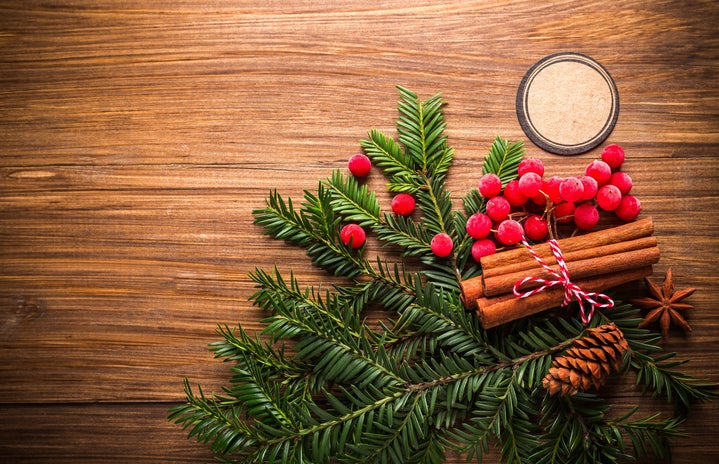December should probably be renamed ‘Christmas’. Actually, there’s no probably about it, it’s more of an inevitability, albeit one that might not occur anytime soon. No matter what your religious beliefs, there’s no denying that traditions associated with festive celebrations, which begin to be advertised as early as September (and that’s optimistically ignoring the occasional mentions which tempt my mother to ‘evade the Christmas whirlwind’ by buying all of her cards and presents in June – which unfortunately work), reign supreme for the final month of the year.
We relate everything to Christmas: snow, holly, carrots, wine, shopping, a star, donkeys. We also engage in the most questionable practises to show off our ‘Christmas Joy’, including decorating our front doors with collections of leaves, writing elaborate gushing letters of gratitude for the most useless ornaments our distant relatives have managed to procure for us, sticking candles into oranges and even setting our puddings on fire, to name but a few.
No matter what you believe, there’s no escaping the lure of being able to justify eating almost half your body weight in one day, watching an extra two hours of television purely in the hope that they might air the latest department store Christmas adverts a few times (of which John Lewis’ offering once again comes up trumps I think) and sneaking in a Love Actually viewing (or at least, the precious few minutes of Hugh Grant doing that dance).
One of the more modern traditions to have emerged for the festive season (as it seems not just content to be restricted to the traditional 12 days) is the battle of the musical charts, as artists vie for one of the most celebrate accolades of the year: their single being Number One in the sales charts in the week that Christmas Day falls. The ‘Race for Christmas Number One’ as it is known is well documented, and I remember sharing the excitement at primary school, with those who successfully guessed the number one single being rewarded with a Quality Street sweet after the Christmas break (in hindsight, probably left over from the teacher’s overindulgence during the holidays and their resulting guilt). There was nothing tenser than the moments I shared with my younger sister waiting to hear that the Spice Girls had successfully topped the charts again, and nothing better than the moment when they did.
The exciting thing though about the race for the Christmas Number One, or at least until Pop Stars: The Rivals and more notably X factor came onto the scene, is that it slightly resembled the Grand National. No matter what the odds are, you just don’t know whose going to take home the prize. The most obscure or unexpected act is still in with a chance to win, and although they won’t always prevail, in the case of 1993 (Mr Blobby) and 2002 (Bob the Builder) that is precisely what happened (or if you want to go really far back, in 1980 the wonderful ‘There’s No One Quite Like Grandma’ made the cut) .
A song gains a certain legacy for obtaining top of the Christmas heap, a special place in playlists to come for many years afterwards, regardless of the success of the artist’s whole career. It ensures that the artist will never completely be forgotten. To be a Christmas Number One single a track had to have an original edge, not necessarily festive, but something that had ‘that extra factor’.
Or at least, this used to be the case. There’s no denying that in recent years, especially since 2005, the competition has been overshadowed by the X Factor’s unshakable grip on the Nation and as a result, the requirements of being a Christmas Number One seems to have become more of a formula. The number one spot has, with the exception of 2009 and 2011, gone to the winning artist of the talent competition (ironically, they are supposedly victorious as a result of their possession of an ‘Xtra factor’) , who conveniently releases their debut cover single of a well-known song the Monday before the Christmas Number One is announced on the following Sunday.
So much so, the X Factor’s domination has instigated retaliation from those who consider themselves fans of ‘real’ music, and believe that the Christmas number one should reflect what is available from existing artists, rather than the latest reality television offerings. The most notable of these was in 2009 when Rage Against the Machine’s loyal fan base utilised social media to regain the top spot for their 1992 release ‘Killing In The Name Of’, a song that would have been unimaginable as Christmas number one a few years earlier due to its lack of relevance to anything festive. It was a statement move from the public, demanding that talent, originality and flair once again be given greater consideration when deciding the number one single. However, while this single’s lack of Christmas spirit (just look at the title really) didn’t prove an issue in its token success at demonstrating it was still possible to top the charts, it ensured that the ‘winning X factor formula’ proved triumphant once again the following year. The one horse race was back on track.
But there is still hope. The trend seems to be bucking and last year, a group of Military Wives’ featuring Gary Malone offering of an original song ‘Wherever You Are’ gained the title, which in my opinion, was a more fulfilling reply to the furore that has been caused by the X Factor’s domination than that offered in 2009, and raised money for a worthwhile cause to boot. It was acknowledged as a worthy contender to the X factor’s reign, and won. But more than that, it was a Christmas Number One that was well, Christmassy.
And this is my main plea. The ‘Race for Christmas Number One’ should be just that, a race. A race that offers up many viable options that are most importantly not made to provide reality television stars with ‘their big break’, nor to respond to the success of these ‘big breaks’ but just to celebrate Christmas itself. They should be songs produced for a love of everything the festive season encompasses, and catchy too.
This year there is a campaign to get ‘Fairytale of New York’, by The Pogues featuring Kirsty McColl, to the revered top spot. This is to mark the 25th edition of the single’s original release, and personally, I hope it gets the title. It is a classic Christmas song endeared by many, concentrating on that other great seasonal occurrence, tiffs between ourselves and those who we hold dearest. It would be fitting it gets the recognition it deserves considering it never actually gained Number One status upon its initial release.
Saying that, I wouldn’t mind seeing ‘The Power Of Love’ by Gabrielle Aplin also standing a chance, and a friend of mine commented ‘I’d like to see Coldplay’s Christmas Lights get to number one, a song by an artist I recognise, but still Christmas orientated.’ To me, these are all worthy contenders, and should be able to be considered just that. They should all be capable of at least having that chance to be on top of the chart, rather than just to accompany the practically already decided winner.
I’m not saying the acts of the X Factor (especially James Arthur, not that I’m biased or anything…) do not deserve success, I’m sure they work very hard, and thus do deserve this to be recognised. Furthermore, I’m not saying that statement choices shouldn’t have the chance to be at the top of the charts. I’d just like to experience that same excitement of not knowing what it is exactly that will top the charts that I felt when I was younger, and the satisfaction when my preferred tune manages to do so. This is my Christmas ‘wish’ for 2012 and I would like it to be accompanied by a mince pie please.

